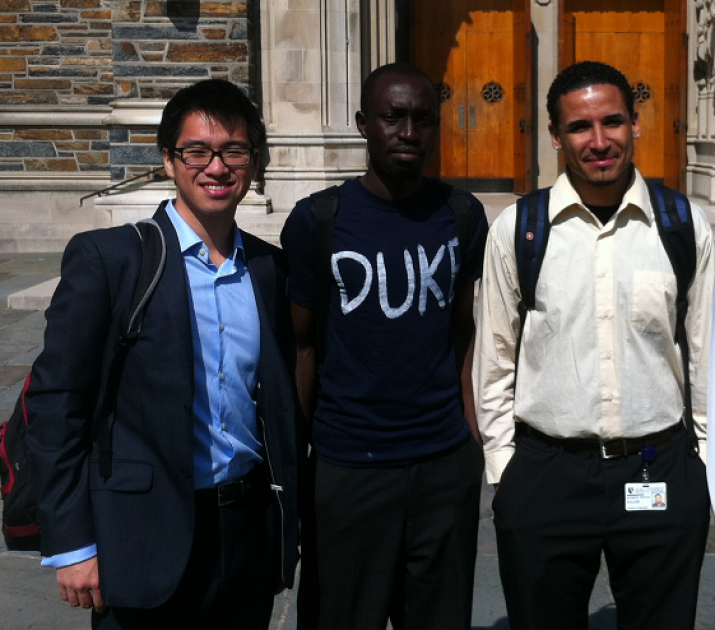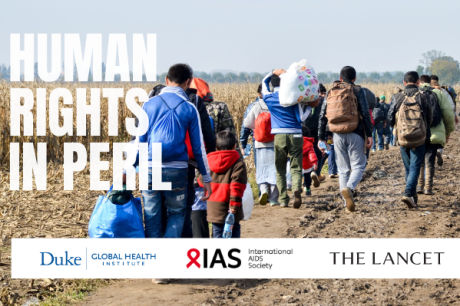
Tu Tran, MSc-GH '14 (l), and Tony Fuller, MSc-GH '15 (r), pose with classmate Joseph Lunyera, MSc-GH '15
Published May 26, 2015 under Research News
Over the last eight years, Michael Haglund, professor of neurosurgery, neurobiology and global health, has led surgical teams of 20-55 medical professionals up to twice per year to Mulago National Referral and Teaching Hospital in Kampala, Uganda, to perform neurosurgery and build capacity. Mulago is one of the Duke Global Health Institute’s (DGHI’s) priority partners in Uganda.
As part of this partnership, DGHI Master of Science in Global Health graduates Tony Fuller ’15 and Tu Tran ‘14 completed a nationwide household survey to understand the burden of surgery in Uganda—where needs are and are not being met. They collaborated with Haglund, faculty mentors at the College of Health Sciences at Makerere University in Kampala (another DGHI priority partner), and Elisa Butler, a University of Minnesota medical student. This information was shared with Uganda’s Health Ministry—a key project supporter—which will use it to shape policy and allocate resources.
Ten Percent of Population Needs Surgery but Can’t Get It
Their study in Uganda found that at least 3.5 million Ugandans—10.7 percent of the population—need a surgical consultation but cannot access care for a variety of reasons.
The study team will work with colleagues at Makerere to deliver a set of policy recommendations that may include more training programs, increased access to surgery at district-level hospitals, injury prevention strategies, earlier access to surgery, and relevant metrics to track progress.
Fuller Reviewed a Decade of Charts to Analyze Surgery Outcomes
Fuller also looked at Mulago-specific data on neurosurgery outcomes. He reviewed 2,000 patient charts that spanned ten years. While he found that infection rates and pre-operative length of stay decreased after the partnership with Duke was initiated, in-hospital deaths increased early on—possibly due to the more complex cases being performed—and post-operative stay lengths remained the same. Fuller continues to analyze the data, much of which is incomplete: patient records don’t indicate the complexity of the cases nor any details related to post-operative care.
Fuller hopes his findings will result in positive change. He is hoping to enter Duke’s MBA program in the fall, which will keep him near this project for the next two years, after which he will complete his final year of medical school at Duke and enter a seven-year neurosurgery residency program.
“We’re bringing all different pieces together to improve the program at Mulago,” said Fuller. His ultimate goal is to help elevate Mulago’s neurosurgery program to the most excellent in all of Africa and replicate the model in district-level hospitals.
Tran Applying for Grants to Further Study Burden of Surgical Conditions
Meanwhile, armed with a robust body of research findings, Tran is collaborating with Makerere professors to fund a surveillance site for more in-depth, longitudinal analysis of surgical burden.
At least 3.5 million Ugandans—10.7 percent of the population—need a surgical consultation but cannot access care for a variety of reasons.


